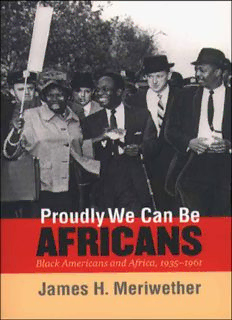
Proudly We Can Be Africans: Black Americans and Africa, 1935-1961 PDF
Preview Proudly We Can Be Africans: Black Americans and Africa, 1935-1961
proudly we can be afr icans The John Hope Franklin Series in African American History and Culture waldo e. martin jr. and patricia sullivan, editors proudly we can be a f r i c a n s black americans and africa, 1935–1961 James H. Meriwether The University of North Carolina Press Chapel Hill and London ∫ 2002 The University of North Carolina Press All rights reserved Manufactured in the United States of America This book was set in Sabon and Charter Types by Keystone Typesetting, Inc. Book design by Jacquline Johnson Publication of this work was aided by a generous grant from the Z. Smith Reynolds Foundation. The paper in this book meets the guidelines for permanence and durability of the Committee on Production Guidelines for Book Longevity of the Council on Library Resources. Portions of Chapter 4 appeared previously in ‘‘African Americans and the Mau Mau Rebellion: Militancy, Violence, and the Struggle for Freedom,’’ Journal of American Ethnic History 17, no. 4 (Summer 1998): 63–86. Library of Congress Cataloging-in-Publication Data Meriwether, James Hunter, 1963– Proudly we can be Africans : Black Americans and Africa, 1935–1961 / by James H. Meriwether. p. cm. — (The John Hope Franklin series in African American History and culture) Includes bibliographical references (p. ). isbn 0-8078-2669-3 (cloth: alk. paper) isbn 0-8078-4997-9 (pbk.: alk. paper) 1. African Americans—Relations with Africans. 2. African Americans—Ethnic identity. 3. African Americans— Intellectual life—20th century. 4. United States—Relations— Africa. 5. Africa—Relations—United States. 6. Africa— Politics and government—20th century. 7. Africa—Social conditions—20th century. 8. Blacks—Civil rights—Africa— History—20th century. 9. Civil rights movements—Africa— History—20th century. I. Title. II. Series. e185.61 .m56 2002 305.896%073—dc21 2001042533 cloth 06 05 04 03 02 5 4 3 2 1 paper 06 05 04 03 02 5 4 3 2 1 For my family, with love contents Introduction 1 Prologue 11 one: ethiopia The Italo-Ethiopian War and Reconceptualizing Contemporary Africa, 1935–1936 27 two: in world war and cold war Configuring Anticolonialism and Internationalism, 1941–1950 57 three: south africa Apartheid and Nonviolent Resistance, 1948–1953 90 four: kenya The Mau Mau and Revolutionary Violence, 1952–1956 124 five: ghana African Independence, 1957–1958 150 six: the year of africa Lows, Highs, and Corners, 1960 181 seven: congo Independence, Black Nationalism, Leftism, and Splintering, 1960–1961 208 Epilogue 241 Notes 247 Selected Bibliography 307 Index 325 acknowledgments This book sits astride many of the major issues and events of the twentieth century: race, civil rights, World War II, the Cold War, anticolonialism. In assessing the dynamic nature of Africa’s role in African American lives dur- ing the mid-twentieth century, we gain new insights into these issues as well as an international perspective on African American, American, and African history. Yet in undertaking this project, I learned along the way that even as the historical profession speaks about the need to ‘‘internationalize’’ history and break down barriers that divide us into narrow fields, there remains a certain institutionalized discomfort in addressing work that does so. For those involved in transnational history, the effort to move outside the com- partments and toward a richer international history can be difficult, yet the rewards are fulfilling. The legion of wonderful people who helped along the way should share the rewards; hopefully my heartfelt thanks at the time and my continuing sincere appreciation offer some compensation. Still, the opportunity to give extra thanks to those who helped beyond all reasonable expectation is a particular pleasure. Robert Hill deserves most special mention for the power of his intellect and the graciousness with which he shared his ideas and time. This book is far better for the advice he gave and the pitfalls he helped me avoid. Just as importantly, James Campbell provided sage advice as I struggled to launch this project and then gave even more as I struggled to end it. Early in the going, Robert Dallek kept me cognizant of the larger picture while show- ing me what a scholar can achieve by wrestling with the sources for a vast topic with grace and balance. Bill Worger consistently prodded me to probe further, while Robert Harris provided excellent advice after reading an ear- lier, much muddier version. Thanks also to Joyce Appleby, who shared both her valuable intellect and her valuable driveway, and to Ben Keppel and Christoph Schulze, who furnished helpful references. Peggy Cordray should be praised by all those who venture further in this book for rescuing them from all too many unclear thoughts and turgid prose. As an initially anonymous reader for the University of North Carolina
Description: